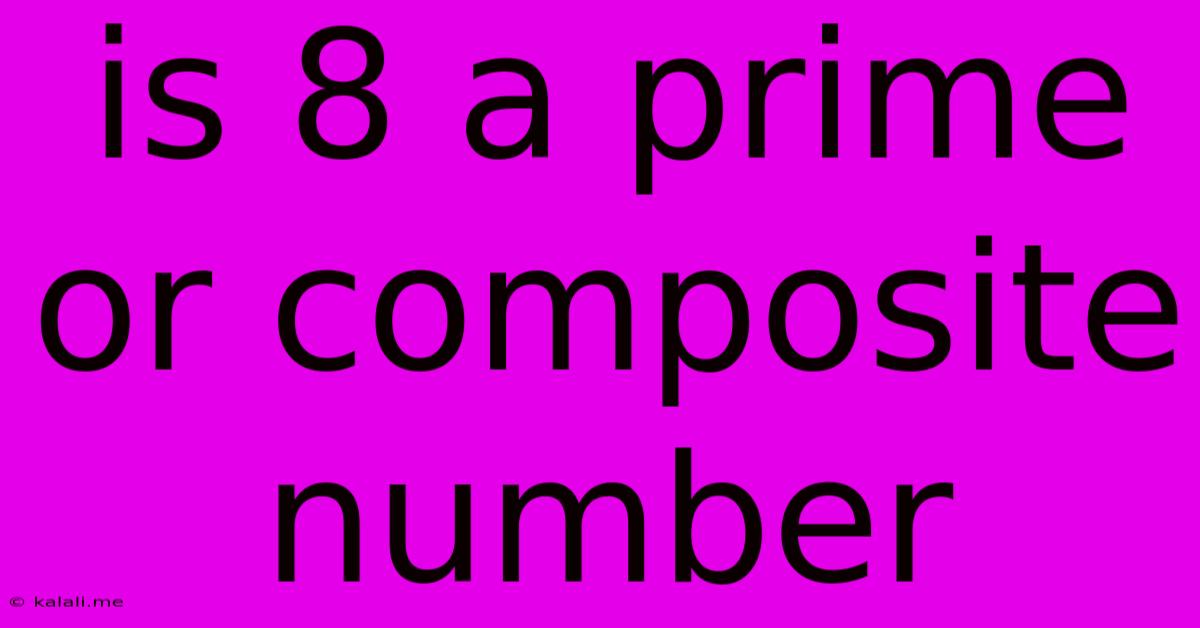Is 8 A Prime Or Composite Number
Kalali
May 10, 2025 · 2 min read

Table of Contents
Is 8 a Prime or Composite Number? A Simple Explanation
Is 8 a prime number or a composite number? This seemingly simple question often trips up students new to number theory. Understanding the difference between prime and composite numbers is fundamental to grasping many mathematical concepts. This article will clearly explain the definitions and definitively answer whether 8 is prime or composite.
What are Prime Numbers?
Prime numbers are whole numbers greater than 1 that have only two distinct divisors: 1 and themselves. This means they are only divisible by 1 and the number itself without leaving a remainder. Examples of prime numbers include 2, 3, 5, 7, 11, and so on. Notice that 1 is not a prime number.
What are Composite Numbers?
Composite numbers are whole numbers greater than 1 that have more than two divisors. In other words, they are divisible by at least one number other than 1 and themselves. For example, 4 (divisible by 1, 2, and 4), 6 (divisible by 1, 2, 3, and 6), and 9 (divisible by 1, 3, and 9) are composite numbers.
Determining if 8 is Prime or Composite
Now, let's apply these definitions to the number 8. The divisors of 8 are 1, 2, 4, and 8. Since 8 has more than two divisors (it's divisible by 1, 2, 4, and 8), it meets the definition of a composite number. Therefore, 8 is not a prime number.
Key Differences Summarized:
| Feature | Prime Number | Composite Number |
|---|---|---|
| Divisors | Only 1 and itself | More than two divisors |
| Example | 2, 3, 5, 7, 11, etc. | 4, 6, 8, 9, 10, etc. |
| Number 1 | Not considered prime | Not considered composite |
Beyond the Basics: Understanding Prime Factorization
Understanding prime and composite numbers is crucial for prime factorization. Prime factorization is the process of expressing a composite number as a product of its prime factors. For example, the prime factorization of 8 is 2 x 2 x 2 (or 2³). This concept is foundational in many areas of mathematics, including cryptography and algebra.
In conclusion, 8 is definitively a composite number, not a prime number because it has more than two factors. Understanding the distinction between prime and composite numbers lays a strong foundation for further exploration in the fascinating world of number theory.
Latest Posts
Latest Posts
-
How Many Bottles Of Water Is 1 Liter
Jul 14, 2025
-
How Many Days In A Million Minutes
Jul 14, 2025
-
How Many Days Is In 11 Weeks
Jul 14, 2025
-
How Many Grams Are In One Tola Gold
Jul 14, 2025
-
How Many Oz In A Pound Of Freon
Jul 14, 2025
Related Post
Thank you for visiting our website which covers about Is 8 A Prime Or Composite Number . We hope the information provided has been useful to you. Feel free to contact us if you have any questions or need further assistance. See you next time and don't miss to bookmark.